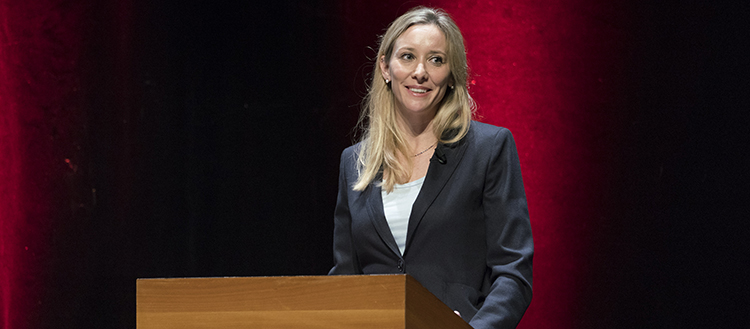Launch of the Geneva Center for Business and Human Rights
UNIGE launches the first Human Rights Center at a business school in Europe, to develop business models that allow profits and principles to coexist.

Dorothée Baumann-Pauly, Professor at UNIGE and Director of the Geneva Center for Business and Human Rights. © UNIGE
How can companies reconcile profits and economic growth with their commitment to human rights? To work with companies on the implementation of human rights in daily business processes, the University of Geneva (UNIGE) will launch the Geneva Center for Business and Human Rights (GCBHR) on 25 November 2019. The GCBHR aims to offer companies a safe space to discuss pressing human rights challenges and to train future leaders to develop and integrate human rights standards in their respective industry contexts. The GCBHR collaborates with the NYU Stern Center for Business and Human Rights to promote human rights in business education through the Global Network of Business Schools for Human Rights.
The law of supply and demand and the pursuit of the lowest possible production cost often lead to extremely abusive working conditions for workers in production facilities. However, in recent years, consumers have become increasingly concerned about the production conditions of the goods and services that they purchase. As a result, human rights violations by brand companies, can cause considerable pressure on companies to improve their practices. In Switzerland, the Responsible Business Initiative is currently discussed in the Swiss Parliament. The initiative aims to make human rights due diligence obligatory for Swiss companies of a certain size.
To support companies in the implementation process of human rights due diligence, the Geneva School of Economics and Management (GSEM) has set up the Geneva Center for Business and Human Rights (GCBHR), whose official launch will take place on November 25th. “We want to show that it is not only the reputation of companies that is at stake, but that respect for human rights also offers opportunities”, explains Professor Dorothée Baumann-Pauly, Director of the Centre. “For example, if a company cares about the working conditions of employees, they will stay longer in their jobs and develop more skills, which will have a positive impact on product quality.”
Combining theory and practice
One of the major challenges is to put into practice the high level guiding documents for corporations, like the UN Guiding Principles for Business and Human Rights. These require further operationalization in specific industry contexts. Initially, the Centre will work with companies in the financial services, commodity trading, and the luxury good sector in Switzerland. This initiative, which is unprecedented in Europe, could help shaping UNIGE’s managerial studies.
For companies in consumer-facing industries, respecting human rights in their business operations is particularly important. “Human rights are universal and we want the Center to make a contribution to establishing industry-specific standards that can become the level playing field for corporations that operate globally”, says Dorothée Baumann-Pauly.
A first conference on modern slavery
The first conference organized by the GCBHR will take place on November 21 (Uni Mail, room 3250, 5:30pm), in collaboration with the Geneva Academy for Human Rights. The expert panel will include Justine Nolan, co-author of the book “Addressing Modern Slavery” which discusses business strategies to identify, analyse and resolve the risks of modern slavery in global supply chains. The expert panel will be moderated by Dorothée Baumann-Pauly and will also include Cindy Berman (Ethical Trade Initiative), Auret van Heerden (NYU Stern Center for Business and Human Rights) and Luiz Antonio Machado (International Labour Organization).
